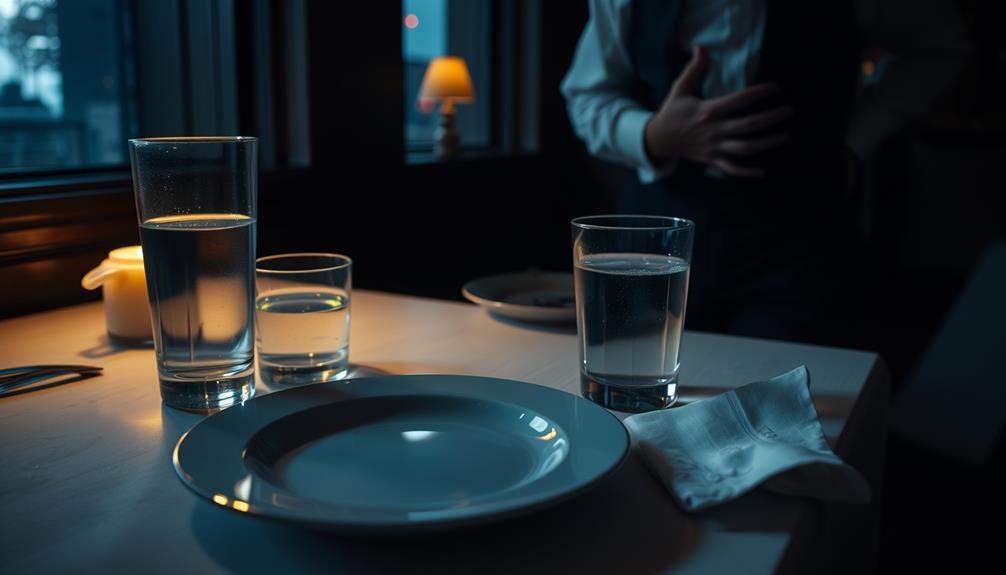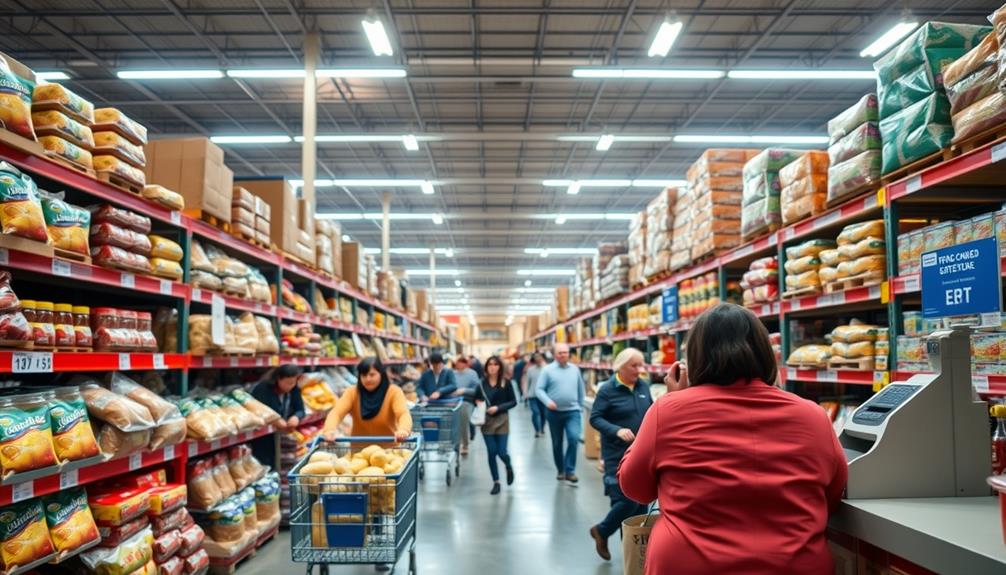Yes, you can sue a restaurant for food poisoning if you prove their negligence caused your illness. First, document your symptoms and seek medical attention. It's essential to gather evidence like food receipts, medical records, and any relevant lab results. You'll need to demonstrate that the restaurant failed in its duty of care, whether by serving contaminated food or inadequate sanitation practices. Compensation can cover medical bills, lost wages, and emotional distress. Understanding your rights and options is key to building a strong case, so you might find it helpful to explore more aspects of this situation. It’s also important to consider ways to prevent food poisoning in the future, such as storing restaurant leftovers safely. By taking legal action, you can not only seek compensation for your suffering but also hold the restaurant accountable and potentially prevent others from experiencing the same harm. Consulting with a personal injury attorney experienced in food poisoning cases can help you navigate the legal process and increase your chances of a successful outcome.
Key Takeaways
- You can sue a restaurant for food poisoning if you can prove negligence or breach of duty of care.
- Gather evidence such as medical records, food receipts, and lab results to support your claim.
- Document symptoms and seek medical attention promptly to strengthen your case.
- Compensation may cover medical expenses, lost wages, and pain and suffering due to the illness.
- Consulting a food poisoning attorney can help you navigate the legal process and understand your rights.
Understanding Food Poisoning
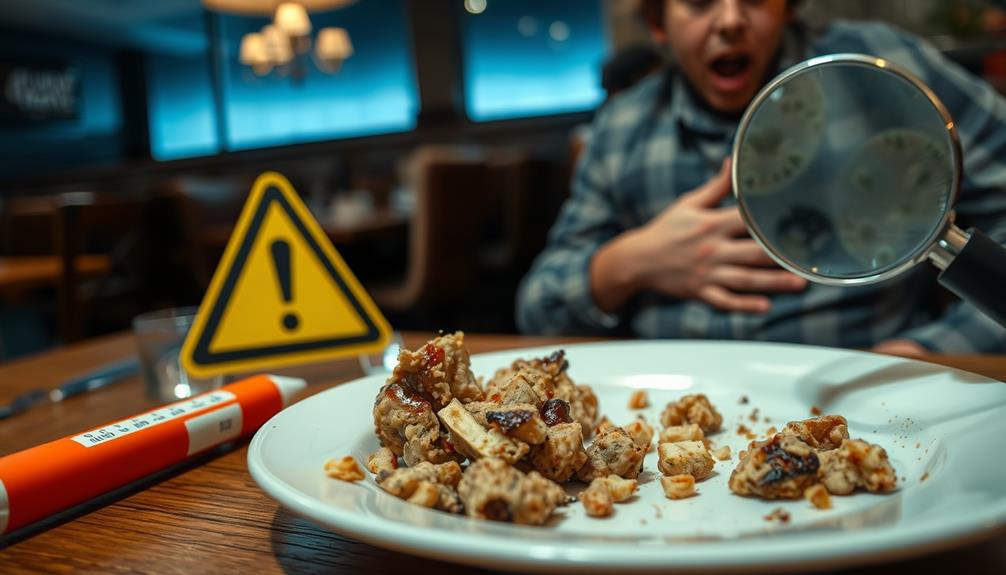
Food poisoning affects an estimated 50 million Americans each year, making it a significant public health concern. This illness results from consuming contaminated food or drinks, often due to harmful bacteria, viruses, or parasites. Common pathogens like Salmonella and E. coli can lurk in improperly handled restaurant meals, leading to serious health issues.
Understanding the importance of cold medications overview can also help individuals manage symptoms if they experience gastrointestinal distress. If you experience food poisoning, you might notice common symptoms such as nausea, vomiting, diarrhea, and fever, which can surface within hours to days after eating.
The severity of your symptoms can vary based on the contaminant, the amount ingested, and your overall health. In some cases, you may need to seek medical attention, especially if dehydration or serious infections occur.
If you've experienced personal injury due to proven negligence at a restaurant, you should know your legal options. Food-borne illnesses can take a toll on your wellbeing and finances, making it essential to understand your rights.
Taking proper food handling precautions can help prevent these illnesses, but if they happen, knowing how to pursue medical treatment and legal recourse is vital for recovery.
Common Causes of Food Poisoning
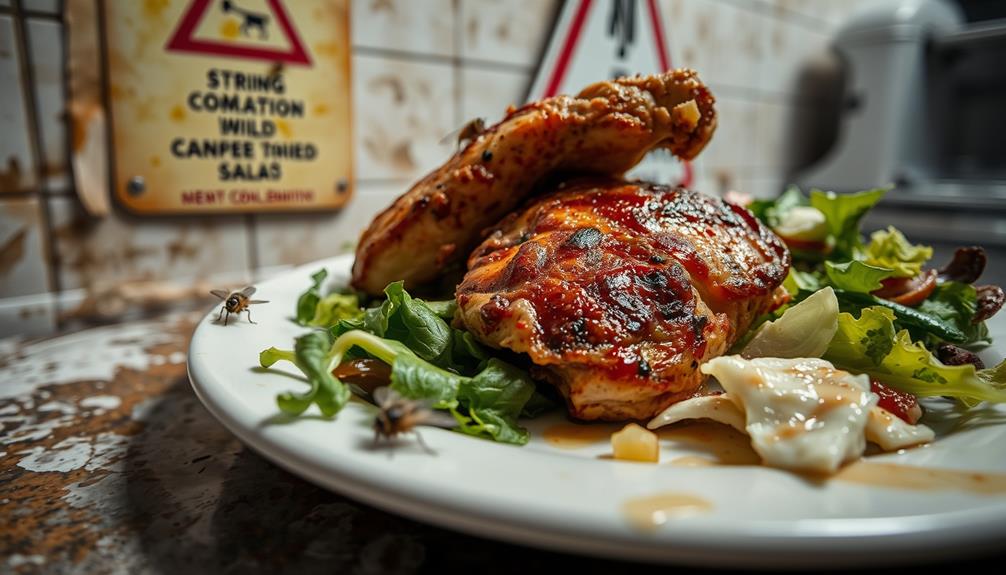
Contaminated meals can lead to food poisoning, and various factors contribute to this serious issue. One of the most common sources of foodborne pathogens includes raw or undercooked meats, which can harbor harmful bacteria like Salmonella or E. coli. Unpasteurized dairy products also pose a risk, as they can contain dangerous pathogens that thrive without proper processing.
Additionally, not practicing proper budget management in food handling can lead to inadequate resources for maintaining food safety. Contaminated water and fresh produce that hasn't been adequately washed are additional culprits in the spread of foodborne illness.
Restaurants can greatly increase your risk of food poisoning if they practice poor sanitation. Inadequate handwashing and cross-contamination between raw and cooked foods create a breeding ground for illness.
The CDC estimates that 50 million Americans experience foodborne illnesses each year, highlighting the widespread nature of this problem. Specific pathogens, like Norovirus, can spread rapidly in food service settings, particularly through contaminated leafy greens and ready-to-eat foods.
To protect yourself, it's crucial to be aware of food safety measures that should be in place at restaurants. Knowing these common causes can help you make informed choices and reduce the risk of food poisoning when dining out.
Symptoms and Health Risks
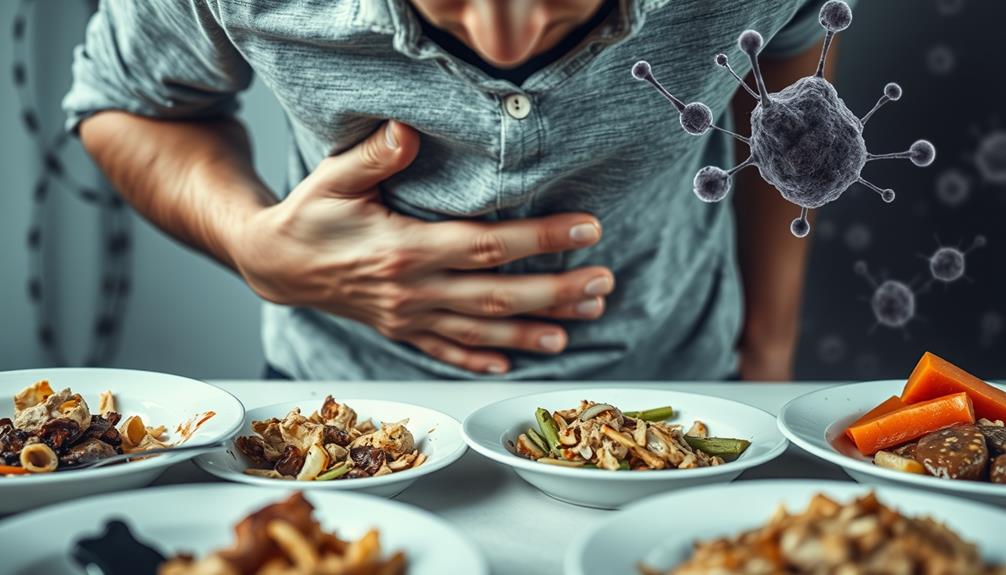
After understanding the common causes of food poisoning, it's important to recognize the symptoms and health risks involved. The symptoms of food poisoning can hit you quickly, often within hours to days after consuming contaminated food. You might experience nausea, vomiting, diarrhea, abdominal pain, and even a high fever.
In some cases, severe symptoms could be indicative of serious health issues, similar to how mammography aims to detect breast cancer early for better treatment outcomes. If you notice severe symptoms like bloody diarrhea or a high fever over 102°F, seek medical attention immediately. Prolonged diarrhea lasting more than three days can lead to serious health complications.
Foodborne illnesses pose significant health risks, with the CDC estimating around 128,000 hospitalizations and 3,000 deaths each year in the United States. Certain pathogens, like Salmonella, E. coli, and Listeria, can cause serious foodborne illness and lead to long-term health issues, including kidney failure or chronic gastrointestinal disorders.
Individuals with compromised immune systems, the elderly, pregnant women, and young children are particularly vulnerable to severe symptoms and complications. If you suspect you've suffered from food poisoning, it's wise to consult food poisoning attorneys who can help assess your situation and protect your rights.
Legal Grounds for Lawsuits
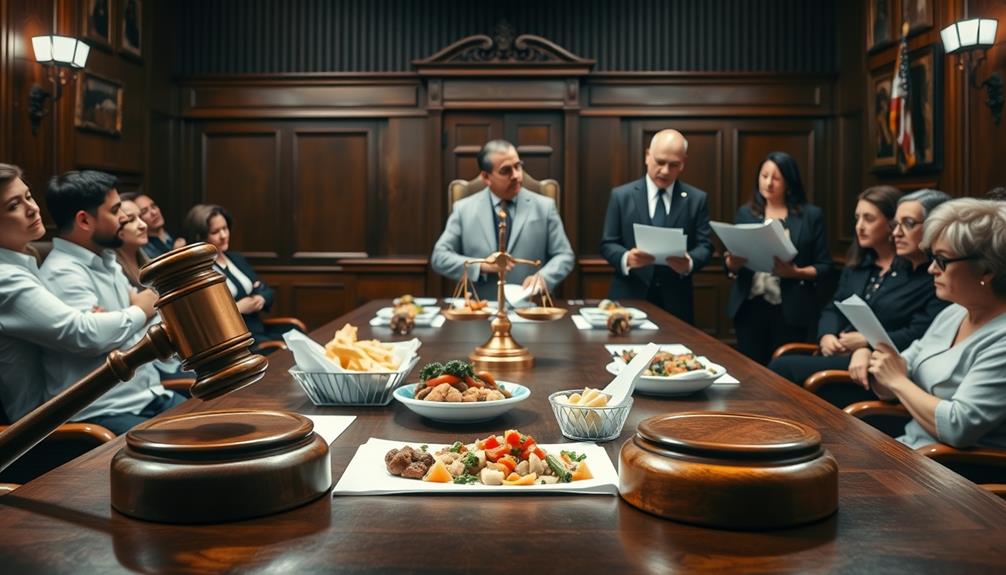
When considering a lawsuit against a restaurant for food poisoning, it's vital to establish legal grounds based on negligence. You need to demonstrate that the restaurant breached its duty of care in handling or preparing food. Common grounds for such claims include serving contaminated food, failing to follow health and safety regulations, or not adequately training staff in food safety practices.
Understanding the legal process of divorce can provide insights into how to approach legal matters effectively.
To strengthen your case, gather evidence like medical records, food receipts, and laboratory test results that link your illness to the restaurant's actions. In Texas, you have a statute of limitations of two years from the date of the incident to file your lawsuit, making it important to act quickly.
If you can prove the restaurant's negligence, you could receive compensation for medical expenses, lost wages, and pain and suffering. This reinforces the accountability of restaurants for maintaining safe food practices.
Proving Negligence in Cases
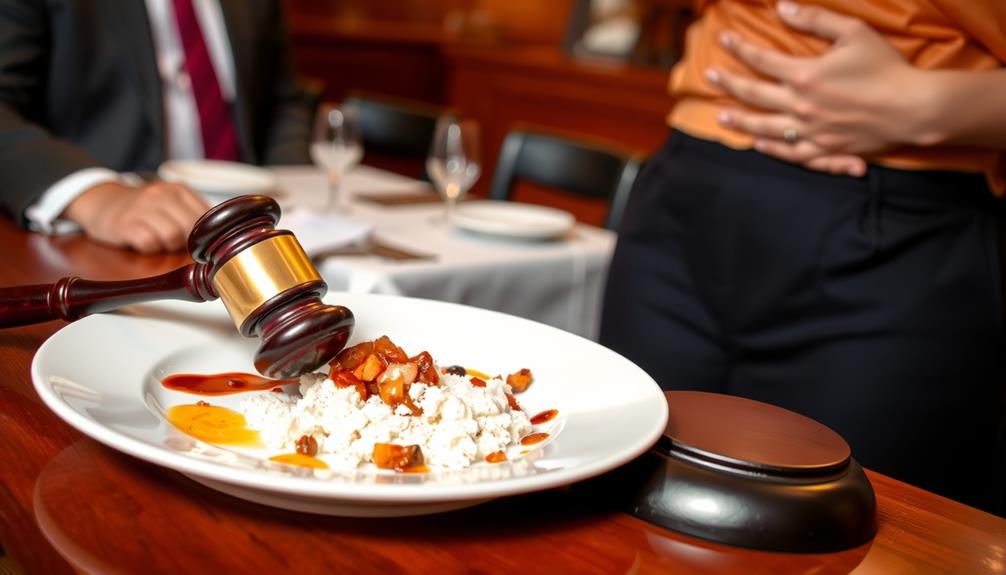
Proving negligence in food poisoning cases hinges on establishing a clear connection between the restaurant's actions and your illness. You need to show that the restaurant owed a duty of care to you as a consumer, ensuring food safety and hygiene practices were followed. This can be particularly challenging, as emotional distress may accompany physical illness, similar to how individuals with BPD experience intense emotional responses.
This often involves gathering key evidence to support your claims.
Here are three significant elements to take into account in your food poisoning case:
- Contaminated Food Evidence: Document any instances of the restaurant serving recalled or contaminated food, especially if pathogens like Salmonella or E. coli are involved.
- Medical Records: Keep thorough medical records that detail your diagnosis and the timeline of symptoms. This documentation can establish causation between the restaurant's food and your illness.
- Health Department Inspections: Testimonies or reports from health department inspections revealing violations of food safety regulations can indicate a breach of duty on the restaurant's part.
Compensation You May Receive
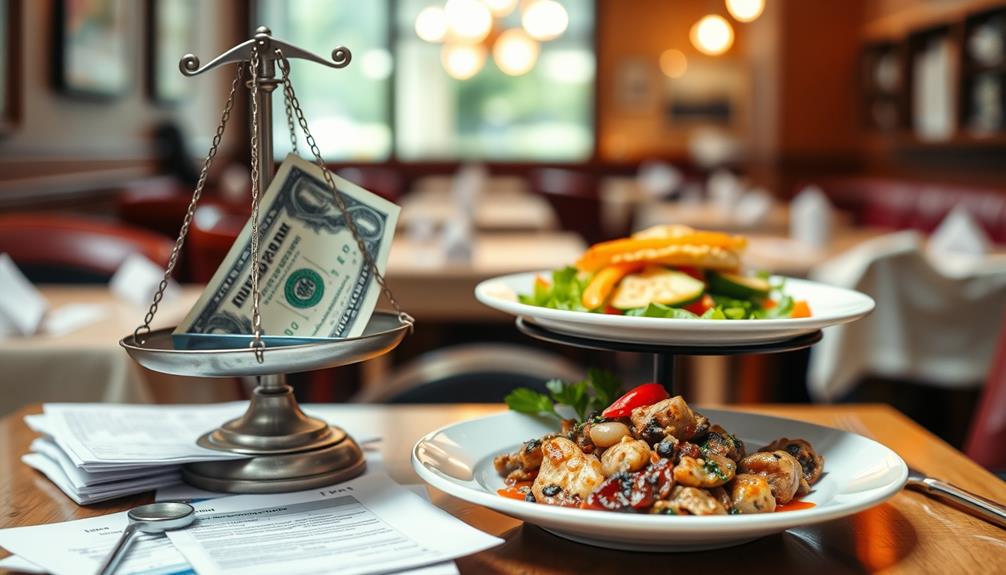
Receiving compensation for food poisoning can greatly alleviate the financial burden caused by your illness. If you successfully pursue a food poisoning lawsuit, you may be entitled to various forms of compensation. This includes covering your medical expenses, which can encompass hospital bills, medication costs, and any ongoing treatment you need after you've experienced symptoms.
Additionally, seeking legal counsel may help you understand potential claims related to tax advantages that can further support your financial recovery.
Additionally, if your illness forces you to take time off work, you can claim lost wages. This financial relief can be significant, especially if your recovery takes longer than expected.
Compensation may also address pain and suffering, accounting for the emotional and physical distress caused by your illness.
In cases of severe food poisoning or wrongful death, further damages may be awarded, reflecting the profound impact on quality of life and loss of companionship.
It's crucial to consult with experienced personal injury attorneys who can help you seek justice. Many operate on a contingency fee basis, meaning you won't pay unless you win your case.
This approach guarantees you can focus on your recovery while pursuing the compensation you deserve.
Steps to Take After Illness
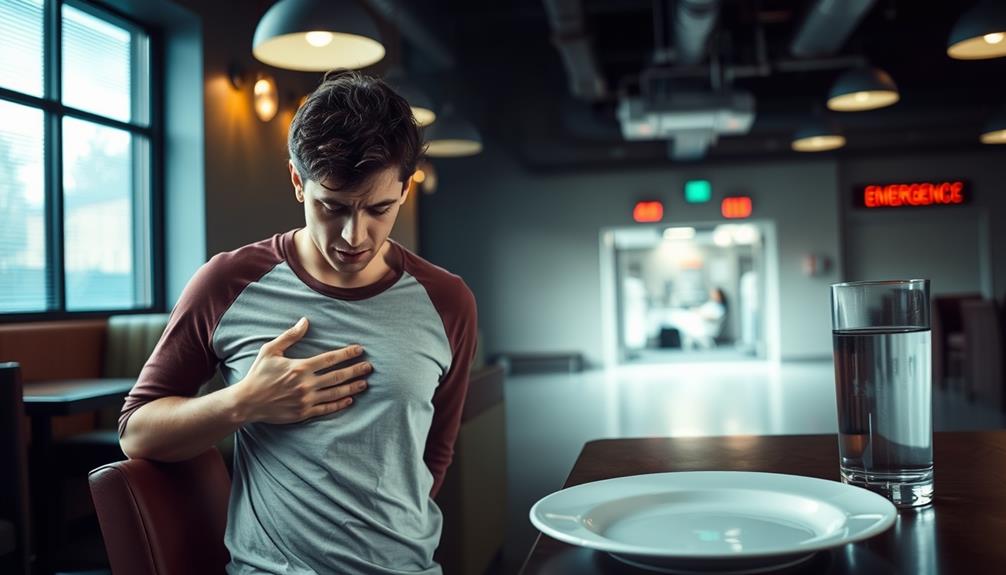
After experiencing food poisoning, it's essential to take immediate action to protect your health and potential legal claims.
Understanding the financial considerations for elderly care may not directly relate to food poisoning, but being aware of your health options and costs can be beneficial in seeking treatment.
Follow these steps to make sure you're covered:
- Seek Medical Attention: Don't delay in visiting a healthcare professional, especially if you have severe symptoms like bloody diarrhea, high fever, or prolonged vomiting. Your medical records will be important evidence later on.
- Document Your Symptoms: Keep a detailed account of your symptoms, including their onset and duration. This information will be crucial when discussing your case with a personal injury attorney or food poisoning attorney.
- Report to Local Health Department: Inform your local health department about your illness. They can help track the outbreak and prevent others from getting sick.
Additionally, retain any food receipts and packaging from the restaurant, as these will serve as essential evidence in establishing the source of the foodborne illness.
Consulting with a knowledgeable food poisoning attorney will help you understand your legal rights and options for compensation. Taking these steps promptly can greatly strengthen your case and make certain you receive the support you need.
Frequently Asked Questions
How Much Compensation Do You Get for Food Poisoning?
Compensation for food poisoning varies widely. You might receive a few thousand to over $100,000, depending on your medical expenses, lost wages, and the severity of your illness. Severe cases can lead to considerably higher amounts.
What Happens if a Restaurant Gives You Food Poisoning?
If a restaurant gives you food poisoning, you'll likely feel like a gourmet meal turned into a nightmare. You might face nausea, vomiting, or worse, all while wondering how something so delicious went so wrong.
Can You Get Compensation for Food Poisoning?
Yes, you can get compensation for food poisoning. If you prove negligence, you might receive funds for medical expenses, lost wages, and pain. Consulting an attorney strengthens your case and helps gather necessary evidence.
Do People Sue Restaurants for Food Poisoning?
When you find yourself unwell after dining out, it's not uncommon to contemplate legal action. Many folks do take restaurants to court over food-related illnesses, seeking justice and compensation for their unfortunate experiences.
Conclusion
If you've suffered from food poisoning after dining out, you might have a case against the restaurant. For instance, consider a scenario where a family gets sick after eating undercooked chicken at a popular eatery. They discover the restaurant had multiple previous complaints about food safety. If you can prove negligence, you could hold them accountable and receive compensation for your medical bills. Don't hesitate to seek justice; your health and safety matter!
